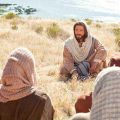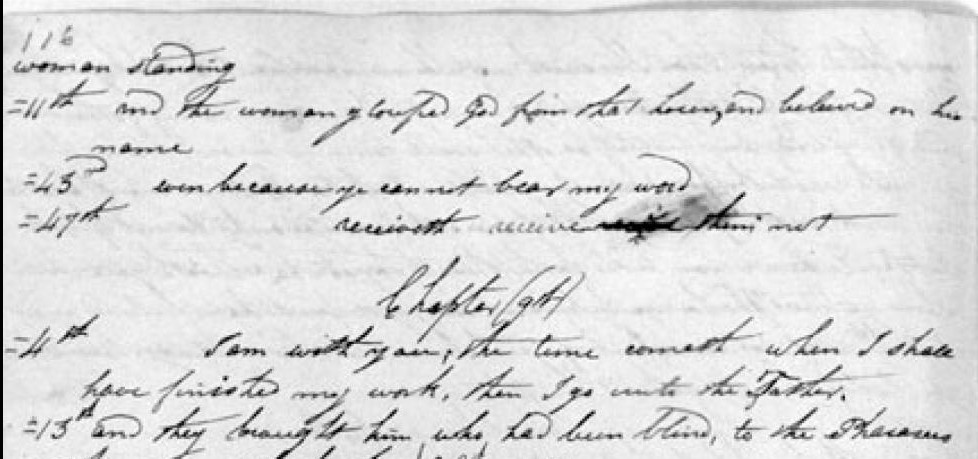Question
Hey Gramps
One of my favorite scriptures that was preliminary to the Restoration of God’s Church is James 1:5 which says, quote, “If any of you lack wisdom, let him ask of God, that giveth to all men liberally, and upbraideth not; and it shall be given him.” I love and understand this scripture for the fact that not only was it such an important scripture for Joseph, but it’s just as important for us as when we’re faced with difficult decisions. What do the following verses 6-8 mean though?
Alex
Answer
Hello Alex,
Thank you for asking this question because it seems there are a lot of people with similar concerns about their own testimony or conviction, “wavering”.
But, first, I want to also acknowledge the fact you recognized the importance that James 1:5 had on Joseph Smith Jr., the Church, and the whole human kind. He indeed represented all of us when he knelt down in the Sacred Grove and without hesitating asked in prayer. He took a quantum leap not knowing what to expect but an answer to his question.
So, let’s take a closer look at Joseph’s example of bravery and resoluteness for the benefit of those not familiar with this essential part of Church History .
Joseph states:
“While I was laboring under the extreme difficulties caused by the contests of these parties of religionists, I was one day reading the Epistle of James, first chapter and fifth verse, which reads: If any of you lack wisdom, let him ask of God, that giveth to all men liberally, and upbraideth not; and it shall be given him.
“Never did any passage of scripture come with more power to the heart of man than this did at this time to mine. It seemed to enter with great force into every feeling of my heart. I reflected on it again and again, knowing that if any person needed wisdom from God, I did; for how to act I did not know, and unless I could get more wisdom than I then had, I would never know; for the teachers of religion of the different sects understood the same passages of scripture so differently as to destroy all confidence in settling the question by an appeal to the Bible.
“At length I came to the conclusion that I must either remain in darkness and confusion, or else I must do as James directs, that is, ask of God” (Joseph Smith—History 1:8, 11–13).
Joseph was so determined to know the truth, he learned to ponder and study the bible with great cynosure, at a very early age. Let’s remember that he was barely a teenager when he decided to ask God. I’m sure he took note of the next three verses before he went to the Sacred Grove:
6 But let him ask in faith, nothing wavering. For he that wavereth is like a wave of the sea driven with the wind and tossed.
7 For let not that man think that he shall receive any thing of the Lord.
8 A double minded man is unstable in all his ways.
Key words (faith, nothing wavering): faith is a verb and requires action. Faith is also the opposite of fear/doubt (in other words, faith and doubt cannot coexist). Doubting is described as a wave of the sea driven with the wind and “tossed“.
Bishop Richard C. Edgley said:
Choose faith over doubt, choose faith over fear, choose faith over the unknown and the unseen, and choose faith over pessimism…”
“Alma’s classic discussion on faith, as recorded in the 32nd chapter of Alma in the Book of Mormon, is a series of choices to ensure the development and the preservation of our faith. Alma gave us a directive to choose. His were words of action initiated by choosing. He used the words awake, arouse, experiment, exercise, desire, work,and plant. Then Alma explained that if we make these choices and do not cast the seed out by unbelief, then “it will begin to swell within [our] breasts” (Alma 32:28).
Yes, faith is a choice, and it must be sought after and developed. Thus, we are responsible for our own faith. We are also responsible for our lack of faith. The choice is yours.
There is much that I do not know. I do not know the details of the organization of matter into the beautiful world we live in. I do not understand the intricacies of the Atonement, how the Savior’s sacrifice can cleanse all repentant people, or how the Savior could suffer “the pain of all men” (D&C 18:11). I do not know where the city of Zarahemla was, as referred to in the Book of Mormon. I do not know why my beliefs sometimes conflict with assumed scientific or secular knowledge. Perhaps these are matters our Father in Heaven described as the “mysteries … of heaven” (D&C 107:19) that will be revealed at a later date.” ( Faith—the Choice Is Yours)
The Lord does not reward doubtfulness but does, however, help us through such in strengthening our faith.
Jesus said: (Matt 14:25-33)
25. And in the fourth watch of the night Jesus went unto them, walking on the sea.
26. And when the disciples saw him walking on the sea, they were troubled, saying, It is a spirit; and they cried out for fear.
27. But straightway Jesus spake unto them, saying, Be of good cheer ; it is I; be not afraid.
28. And Peter answered him and said, Lord, if it be thou, bid me come unto thee on the water.
29. And he said, Come. And when Peter was come down out of the ship, he walked on the water, to go to Jesus.
30. But when he saw the wind boisterous, he was afraid ; and beginning to sink, he cried, saying, Lord, save me.
31. And immediately Jesus stretched forth his hand, and caught him, and said unto him, O thou of little faith, wherefore didst thou doubt?
32. And when they were come into the ship, the wind ceased.
33. Then they that were in the ship came and worshipped him, saying, Of a truth thou art the Son of God.
Being of little faith, or having doubts, hinders our progress and stunts our spiritual growth. It is the very antithesis of progression, which is an effective tool in the hands of the adversary to defeat the righteous.
Another excellent talk I’ve read in the recent past was given by President James E. Faust, here is an excerpt:
“To those who believe but wish their belief to be strengthened, I urge you to walk in faith and trust in God. Spiritual knowledge always requires an exercise of faith. We acquire a testimony of the principles of the gospel by obediently trying to live them. Said the Savior, “If any man will do his will, he shall know of the doctrine.” A testimony of the efficacy of prayer comes through humble and sincere prayer. A testimony of tithing comes by paying tithing. Do not let your private doubts separate you from the divine source of knowledge. Prayerfully go forward, humbly seeking eternal light, and your unbelief will be dispelled. I testify that if you continue in the purposeful process of searching for and accepting spiritual light, truth, and knowledge, it will surely come. By going forward in faith, you will find that your faith will increase. Like a good seed, if it is not cast out by your unbelief, it will swell within your breast” (Lord, I Believe; Help Thou Mine Unbelief)
Now, let’s briefly address verses 7 and 8.
God will not enlighten someone with a “double mind“. Another way to describe a double-minded individual is hypocrisy. In a talk given by President James E. Faust he explained that:
“hypocrites are those who outwardly wear masks that portray goodness but inwardly practice evil and deceit”. (Enemy within)
In summary, we are commanded to always have faith when approaching Heavenly Father in prayer and to ask Him anything because He will always answer our prayers. But let’s not doubt and/or be hypocrites when we do ask him because he will not answer such requests.
I hope this has sufficiently answered your question and most importantly, has dispelled any doubt you might have had.
Gramps







